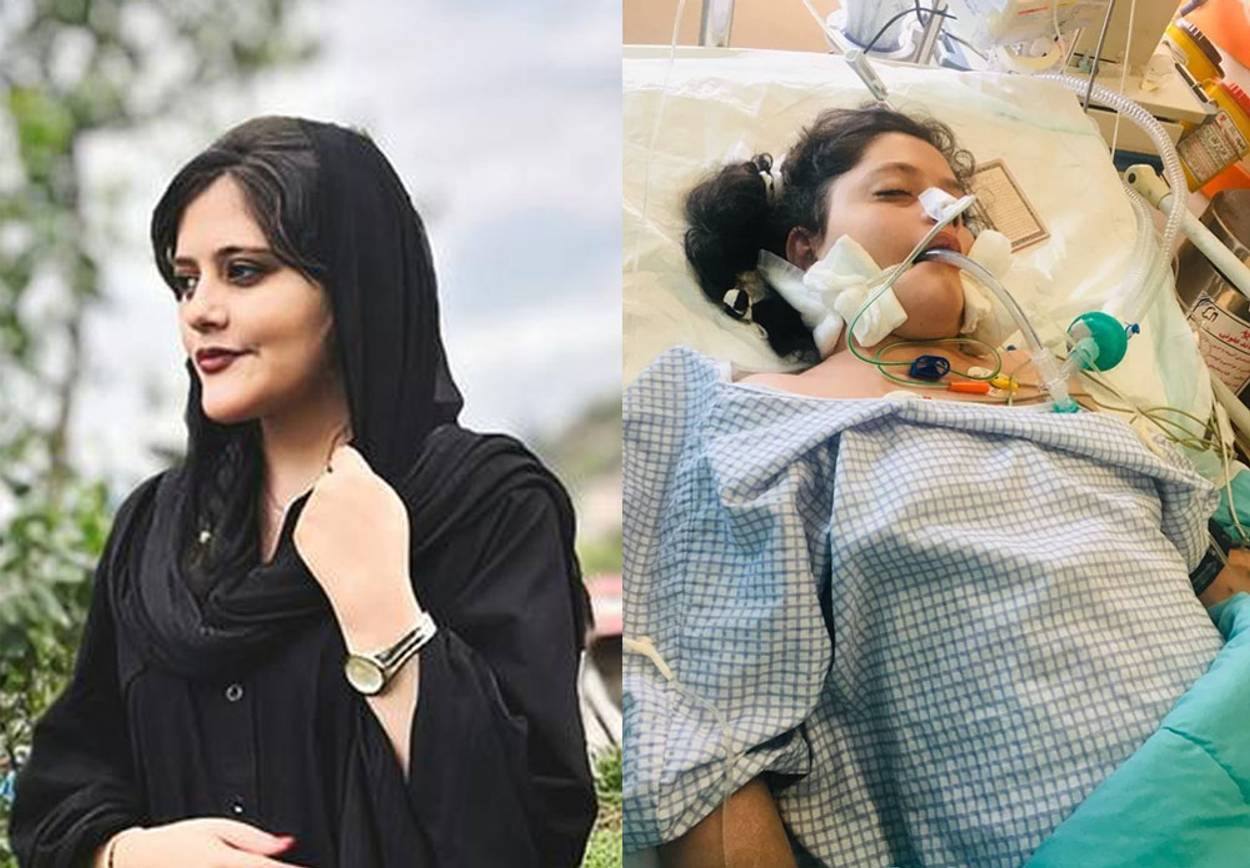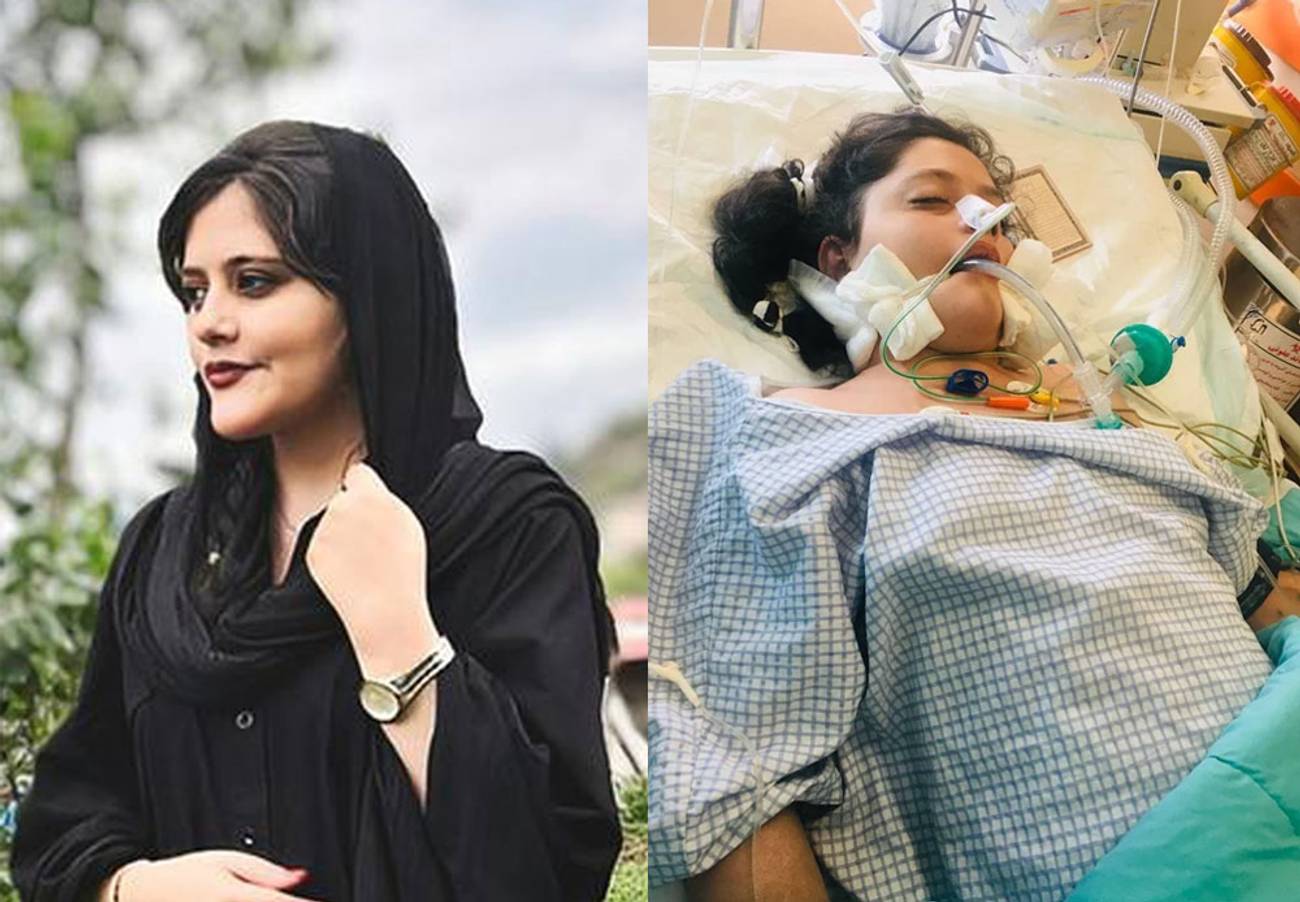The Gender Apartheid State of Iran
Why does Joe Biden seek to align America with a violent ‘Handmaid’s Tale’ regime that beats women to death for exposing their hair?




Mahsa (Jeena) Amini died in a coma on Sept. 16 after repeated blows to her head by Islamist regime thugs enforcing mandatory Islamist hijab. She could have been any 22-year-old Iranian girl, killed because strands of her hair were showing from beneath her headscarf. We know her story only because her brave Kurdish family refused to cower, despite being surrounded by regime agents and threatened to be silent. Mahsa’s family has been bravely telling reporters their girl was healthy, that the regime’s fabricated video purportedly showing her collapsing from a heart condition is a lie. Her father, as well as girls who were arrested with her, testify that they saw bruises on her head, a fact confirmed by a leaked photograph of the bruised, unconscious girl in a hospital bed.
Officials from the hospital where Mahsa died have also spoken out, another courageous act, telling reporters Mahsa had 10 or 11 blows to her head, likely from it being bashed into a wall. The other women and girls who were arrested with Mahsa for violating the hijab have stated that Mahsa’s beatings began in the police van where they were all held.
Most striking is testimony via Twitter and submitted to regime officials from Hasan Shirazi, a first lieutenant in the “morality” police station to which Mahsa was brought. Mahsa was holding her head and screaming loudly when she was taken out of the police van, says Shirazi. A female guard told her she would be released soon, but Mahsa would not stop screaming.
Hearing her screams, a senior officer, Colonel Seyyed Abbas Hosseini, reportedly became very angry and approached the women. According to Shirazi’s testimony, Hosseini told Mahsa to shut up and punched her so hard that she fell to the ground, unconscious. Everyone at the station was apparently silent as Colonel Hosseini then began to kick Mahsa and ask that she be taken to basement level 2, the “darkest unit” of the detention center. The women guards could not lift Mahsa and one cried out in panic that her ear was bleeding. It took 20 minutes for an ambulance to come take Mahsa to the hospital.
Since the imposition of Sharia law in the 1979 revolution, there have been countless girls and women like Mahsa. Today the reality of this nightmare is being disseminated across the world because Iranians are rising up against the totalitarian evil of the regime and speaking out about the lashings, torture, rape, and killings. The actress Banafsheh Taherian is a striking example, showing her solidarity with Mahsa’s family by going public about receiving 60 lashes from regime police when she was 19-years-old. Her Twitter thread about this trauma is excruciating to read, in part because every Iranian has a loved one who has been on the receiving end of these blows and the verbal abuse and humiliation that accompanies them. These are very rare public admissions. Iranians have in large part stayed silent, particularly about torture and sexual abuse in prisons.
This week, all of Iran is aflame in protests sparked by the knowledge of Mahsa’s gruesome murder. Her eyes were hauntingly innocent, her smile gentle and kind in a land of horrors. The protests span the entire nation, all major cities and smaller towns. Online, too, the mobilization is as never before, a unity in discourse with film stars, athletes, and other celebrities breaking their silence and joining the people in their public revulsion against the barbaric cruelty and violence with which the regime treats the people of Iran in the name of Allah. On the streets, girls and women are burning their headscarves, dancing—acts punishable by lengthy prison sentences and even execution—as men young and old honor them, chanting for equality and promising vengeance for the killing of their sister Mahsa. These are scenes Iranians have seen in their dreams, a revolution of love for their true selves and hate for the armor-clad forces of darkness they surround and capture. It is the power of political action as Hannah Arendt described it, tethered to life by fear but also by transformative hope.
That Iranians are willing to brave the Islamic Republic’s repressive apparatus yet again is remarkable considering the massacre of over 1,500 protesters in 2019, the torture of many thousands more, and the execution of others including the champion wrestler from Shiraz, Navid Afkari, who was and is beloved for his honesty and passion for his people.
Yet this is a regime utterly committed to its brutality. Its current president, Ebrahim Raisi, protected by U.S. authorities and greeted at the United Nations with smiles and handshakes by French President Emmanuel Macron just as Iranians protest for their freedom—is among the most experienced killers of Supreme Leader Khamenei’s inner circle, personally culpable for the execution of thousands in a prison massacre in 1988. Raisi is a hardline ideologue who is barely intelligible, with no university education. Even now, Raisi is proud of his role as one of four members of a death committee, sending political prisoners to be hanged after “trials” lasting a few minutes. He has called his massacre “divine punishment” and a “proud achievement” for the revolutionary regime. For him, mass killing is an act of God. Days ago, he denied the Holocaust in a 60 Minutes interview. Why does the United States insist on embracing this killer, and the regime he fronts, as the Iranian people risk their lives in the streets protesting for freedom?
When President Barack Obama promoted the original Iran deal, his pitch was that the normalization of ties with the Islamic Republic would improve the welfare and freedoms of ordinary Iranians. The exact opposite happened. Even with injections of billions in cash into the regime’s coffers, the people grew poorer and the state more repressive. The so-called “moderate” former President Hassan Rouhani presided over the killing of over 1,500 protesters. That President Joe Biden wants to obtain a watered-down version of that deal with Raisi in Rouhani’s office, and with the supreme leader still in power, shows the moral vacuity of a foreign policy that aligns itself with the most repressive tyrants on the planet, even as they murder women, gay people, political liberals, journalists, and anyone else who dares to assert the most basic claims to their own humanity.
Biden has been willing to stick Americans with extortionate gas prices in order to fight for Ukraine and trash our alliance with India by sticking up for “human rights” in the subcontinent. But when it comes to Iran, the president of the United States and leading officials in his administration have been eager to abandon young Iranians, women especially, who have been fighting courageously for freedom since 2009. The greatest asset America has for a peaceful Middle East is the Iranian people, and yet the Obama-Biden playbook is predicated on their permanent oppression under the heel of a brutal regime of America-hating, Holocaust-denying, theocratic misogynists who beat women to death for exposing their hair.
There is no telling whether this time the Iranian people will finally win. What is certain is that the Handmaid’s Tale regime that hates women and hates America is still being courted by the Biden administration, which is a failure not just of our morality but of our national interest. When you look at the photographs of beautiful young Mahsa Amini tortured to death, and when you watch videos of the same thugs who killed her attempting to beat her young compatriots for protesting for her life, remember that these are the thugs the United States is attempting to equip with more power, more cash, and more prestige, at the expense of people who desperately want to be free of their tyranny.
Mariam Memarsadeghi is Founder and Director of the Cyrus Forum, Senior Fellow at the Macdonald-Laurier Institute, and a leading advocate for a democratic Iran.